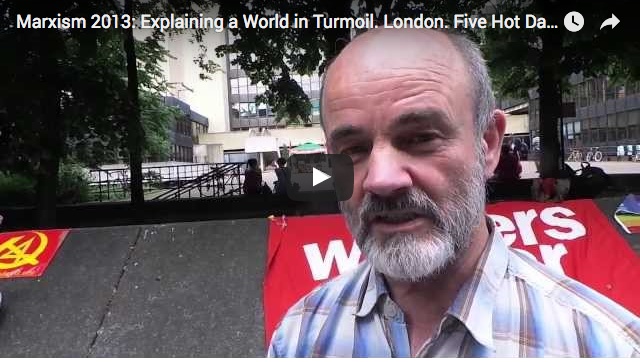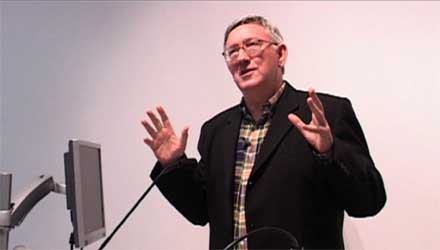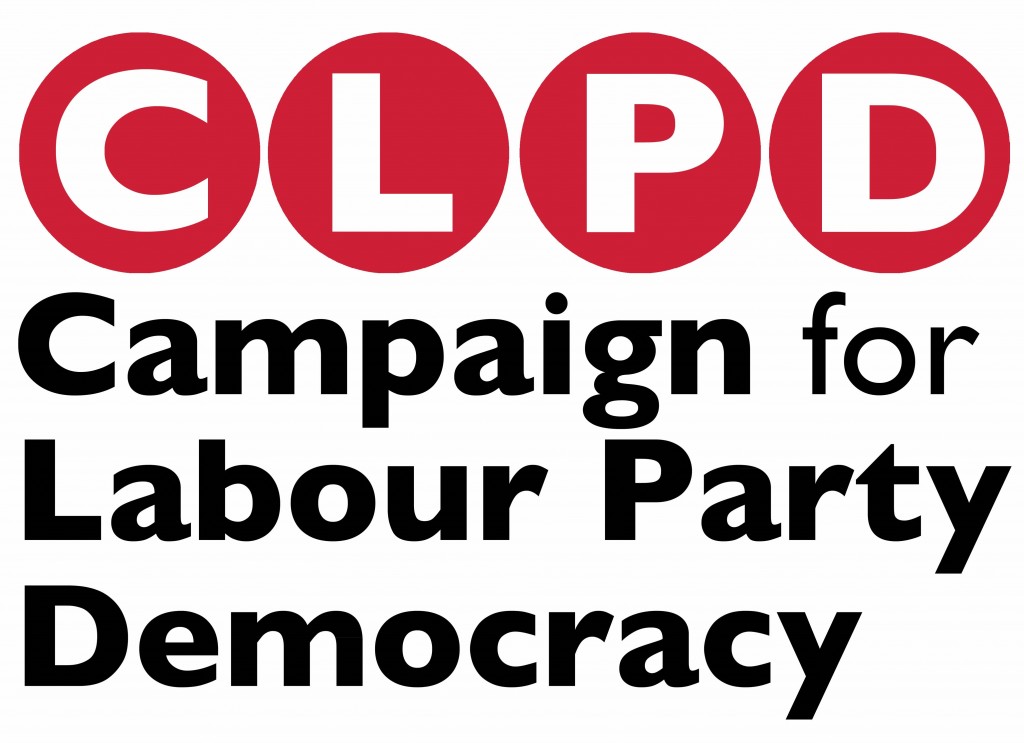Calling Miliband ‘Red Ed’ is a joke, writes Stan Keable of Labour Party Marxists
Listening to Ed Miliband and Ed Balls dispensing policies from above at party conference tells us all we need to know about the hollowed-out condition of Labour Party democracy. Conference should be the highest authority in the party, where delegates from constituency parties and affiliated organisations decide policy that is binding on representatives, on local councils and in parliament. Instead, we have a media rally, in which delegates are reduced to fawning acolytes of the leader and shadow cabinet members in a disgusting display of undemocracy.
Not only has the straightforward process of members submitting motions for conference through their local party organisation been supplanted by the opaque system of policy commissions, but this perversity itself is kicked aside when the leadership decides to announce a new policy.
And in the face of the ongoing decline and crisis of the capitalist system, what miserable policies they offer. A few crumbs and soundbites, wrapped up in firm promises of continuing cuts and austerity should Labour be elected in 2015.
As Ed Miliband put it, “It is going to be tough. We are going to have to stick to strict spending limits to get the deficit down.” Likewise, Ed Balls promised “economic responsibility and fiscal rigour”, which is somehow different from the policy of “this out-of-touch, Tory-led government”. “Labour will always make different choices. We will combine iron discipline on spending controls with a fairer approach to deficit reduction.”
Nevertheless, the rightwing press is already announcing the return of ‘Red Ed’ because of the policy changes he has announced. In place of Tory tax cuts for 80,000 large businesses, Labour will cut business rates for 1.5 million small businesses. The minimum wage has been falling in value (but so have all our wages!), so Labour will “strengthen” it – ie, restore it to its original magnificent value, and increase fines against employers who pay less – in order to “make work pay for millions in our country”. Labour will “reset the market” and “freeze gas and electricity prices until the start of 2017”. The bedroom tax will be repealed, and by 2020 “we will be building 200,000 homes a year”. To facilitate this, private developers who “just sit on land and refuse to build” will be told, “Either use the land or lose the land”. Lastly, voting rights will be extended to 16 and 17-year-olds to “make them part of our democracy”.
Ed Balls announced a “compulsory jobs guarantee for young people and the long-term unemployed”. Oh, good, you might think – employers will be forced to provide jobs. Unfortunately the “compulsory” applies to the worker, not the employer: “And we will work with employers to make sure there will be a paid job for all young people out of work for more than 12 months and adults out of work for two years or more, which people will have to take up or lose benefits.”
In his conference speech, Ed Miliband said not a word about Syria. It was left to Balls to proudly emphasise Labour’s imperialist war credentials: “It is the Labour leader,” he said, “who on Syria had the courage to stand up and say that if the case was sound and the United Nations was properly engaged, Labour would support military action … No Labour government will ever stand aside when terrible atrocities are committed and international law is broken.”
Despite the promised crumbs, the ‘next Labour government’ under the two Eds – if it happens, which is by no means certain – will be a government of British capitalism, not a government of the working class. It will be an anti-working class government because its political programme is to run British capitalism. Like previous Labour governments to date, it will be able to attack the working class ‘in the national interest’ all the more effectively because it is ‘our government’.
Socialist programme
The Labour Representation Committee, which has its annual conference on Saturday November 23,1 aims to transform the Labour Party into a real workers’ party, into an umbrella organisation of all working class and socialist organisations, to fight for working class interests and socialism. It also aims for the election of a Labour government. But it needs to put these two aims in the right order.
As Labour Party Marxists argued in a motion two years ago, “A Labour government which runs capitalism will be counterproductive for the workers’ movement.” The motion continued: “History shows that Labour governments committed to managing the capitalist system and loyal to the existing constitutional order create disillusionment in the working class.” Consequently, “the Labour Party should only consider forming a government when it has the active support of a clear majority of the population and has a realistic prospect of implementing a full socialist programme”.2
Getting socialists elected to parliament, from where they can champion the movement, is a good idea. It is running a capitalist government, or joining one, which is counterproductive. The movement can only be re-educated in socialist politics and rebuilt into a mass movement in struggle against any capitalist government, whatever its political colour, until the working class is capable of sweeping the system away. It cannot be built by sacrificing socialist principles and selling out working class struggles for the electoral success of political careerists.
Seen in this light, the two Eds are clearly part of the problem, not part of the solution. That is why I take issue with comrade John McDonnell’s “verdict on Ed Miliband’s conference speech” on the website of the Left Economics Advisory Panel, which displays unwarranted hope that a Miliband government might be a stepping stone towards socialism. I have not seen this “strategy” spelled out before, so I will quote it in full. It goes a long way to explain the ambiguity of the LRC’s political behaviour:
“Since Ed Miliband became leader, the strategy of the left has been to make issues safe for him by building support within and outside the party issue by issue. Only when it’s safe is he confident about moving on an issue. Today’s speech demonstrated that we are setting the agenda, but there’s so much further to go. A major house-building programme is needed, but it needs to be public housing alongside rent controls to stop landlords profiteering from housing benefits.
“Challenging the scapegoating of unemployed and disabled people needs to be made a reality by scrapping the rigged capability tests associated with Atos and abolishing workfare. Time-limited price controls won’t end the rip-offs. A clear commitment to end privatisation is needed, especially in the NHS, and to bring rail, water and energy back into public ownership, plus, if it goes ahead, Royal Mail.
“To tackle low pay, we need to make the minimum wage a living wage by right, re-establish trade union rights and restore a commitment to full employment. People already suspect this is a recovery for the rich and ongoing recession for the rest. This is exactly the time when people want more radical action. Make today’s speech a beginning.”3
Such faith in Ed Miliband’s socialist potential is quite touching, but I must remind you, John:we are talking class struggle and socialism; Ed Miliband is talking ‘one nation’ class-collaboration and capitalism – including imperialist war, as Ed Balls made explicit.
Union link
Harriet Harman opened the ‘debate’ on the interim report by Lord Ray Collins published immediately prior to conference, entitledBuilding a one nation Labour Party – perhaps an appropriate title for a process designed to weaken the Labour-union link and bury the class struggle.
“You could not have anyone better than Ray,” she told us, “to listen to everyone’s views and to draw them together.” And there, in a nutshell, is the method of Labour Party ‘democracy’ today. You get to express your views, as in an employer’s suggestion box. Those above “listen”, so you feel grateful and wanted. Then they cherry-pick the ideas they want, and tell you it’s what you have collectively chosen.
Lord Collins stressed how proud he was to be a trade unionist and told us not to worry – Labour should “retain the constitutional collective voice of the unions”. Ed wanted to “mend the link, not end the link”, he claimed. But it has to change, so that it is “open and transparent”.
The interim report covers more than the union link, however. It sets out what ‘Ed wants’ in a renewed relationship with the unions, in which, Ray assures us, collective affiliation will not be touched; the development of standardised constituency development plans (more central control?); primaries, starting with the London mayor contest; and “fairness and transparency” in the selection of candidates. Each section has a series of questions along the lines of ‘How shall we fulfil Ed’s idea?’ Everything will be settled at the special conference in March 2014.
GMB general secretary Paul Kenny, speaking on behalf of all 14 Labour-affiliated trade unions, organised in the Trade Union and Labour Party Liaison Organisation (Tulo), said: “The removal or sale of our collective voice is not on the agenda. We are certainly not going to accept any advice on democracy and transparency from the people who brought us the ‘cash for honours’ scandals or whose activities are funded by cash from wealthy outsiders who refuse to give to the party, but prefer to lay cuckoos in CLP nests.”
He went on: “We think the real debate this week is about jobs, homes, living standards, employment rights, not irrelevant navel-gazing about internal party structures, which frankly the British public do not give a fig about … Now let us get on with the real business of winning back millions of voters to ensure we bring the hope and social justice the British people deserve.”
Eerily, this philistine approach of belittling the vital question of the struggle for real democracy – in our movement, as well as in society at large – is common to both the left and the bureaucracies of the trade unions and of the Labour Party. For the working class to liberate itself from capitalism, democracy in our own movement is a precondition. Only through a combination of open discussion and unity in action can we sort out our differences, develop class-consciousness and become capable of leading society out of the abyss of declining and crisis-ridden capitalism.
Transforming the Labour Party into an instrument fit for working class purpose necessarily means democratising the trade unions which form its base. The status quo, with unions dominated by entrenched bureaucracies, makes them ineffective as a means of defence. Democratising the unions to make the bureaucracies into servants instead of masters is “the real debate” – and will make all the difference in the world to the struggle for “jobs, homes, living standards, employment rights”.
Notes
1. See www.l-r-c.org.uk.
2. LRC AGM, January 15 2011. The motion was defeated.
3. http://leap-lrc.blogspot.co.uk.









